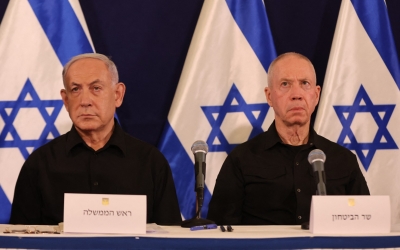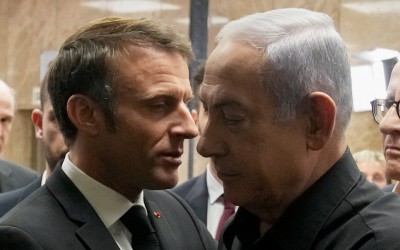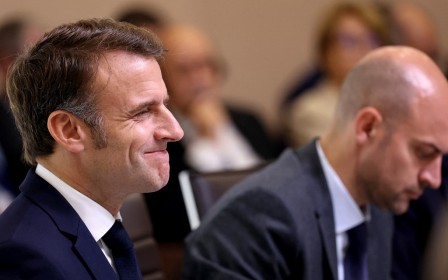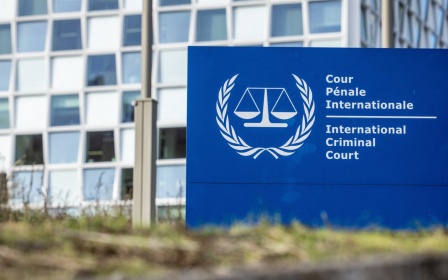Do Netanyahu and Israeli officials have immunity from arrest in the UK?

Days after the International Criminal Court (ICC) issued arrest warrants for Israeli Prime Minister Benjamin Netanyahu and former Defence Minister Yoav Gallant, Israel’s military chief of staff Herzi Halevi landed in the United Kingdom on an official visit.
Halevi, the highest ranking member of the Israeli army, reports to the defence minister. He is widely expected to be the subject of a further arrest warrant, as ICC Prosecutor Karim Khan vowed to seek more warrants over suspected war crimes and crimes against humanity committed in Gaza.
The issue of an ICC arrest warrant for an Israeli travelling to the UK would automatically trigger a diplomatic crisis for Downing Street, as Britain has been a key backer of Israel's war on Gaza.
Asked by Middle East Eye this week whether the British government has granted Halevi special immunity, as it has in the past, the Foreign Office refused to say.
Foreign Secretary David Lammy said on Monday that “there would be a court process and due process would be followed” if Netanyahu visits the UK.
New MEE newsletter: Jerusalem Dispatch
Sign up to get the latest insights and analysis on Israel-Palestine, alongside Turkey Unpacked and other MEE newsletters
“It would be ludicrous to think that the guy that pulled the trigger is going to get away with war crimes," said Tayab Ali, the British lawyer who has previously sought arrest warrants for former Israeli foreign minister Tzipi Livni and defence minister Ehud Barak in London.
"In any event, whether or not there is an arrest warrant, the UK should be considering its own obligations to arrest and prosecute suspected war criminals. What does it say about the British government that, instead, they may try to protect them,” he told Middle East Eye.
Leading British human rights lawyers, including Baroness Helena Kennedy and Amal Clooney, have previously argued that the UK should not grant special mission immunity to individuals suspected of or associated with serious international crimes, including torture, war crimes, crimes against humanity and genocide.
In an unprecedented statement that triggered widespread condemnation, France claimed on Wednesday that Netanyahu may benefit from immunity due to being a national of a non-ICC state.
In the UK, there are legal arguments that are expected to be made to shield Israeli officials from criminal prosecutions, although the ICC's jurisprudence has unequivocally rejected immunities for serving or former state officials.
The ICC's arrest warrant decision is binding on all 124 member states of the Rome Statute, including the UK and all EU countries.
Below, Middle East Eye unpacks the loopholes in UK law and ICC law that are likely to be used to grant Israeli leaders immunity from prosecution, and what experts and judges have said to refute them.
Special mission immunity
Special mission immunity (SMI) is an ad hoc type of immunity granted to members of a temporary mission sent by one state to another.
It protects the visiting members of a mission from the jurisdiction of the receiving state, according to the 1969 New York Convention on Special Missions, which the UK has yet to ratify. SMI is broader than diplomatic immunity, which only protects diplomats.
Former Foreign Secretary William Hague introduced SMI as state practice in March 2013, but it has not been codified into UK law.
Hague defined SMI as: “A temporary mission, representing a state, which is sent by one state to another with the consent of the latter, in order to carry out official engagements on behalf of the sending state.”
According to Conservative MP David Rutley, as of April 2024, the Foreign Office had given 57 certificates of special mission status for officials and their delegations since Hague’s announcement in 2013.
Most of those granted the protections have been Egyptian and Israeli leaders, reflecting a surge in efforts to protect those officials from universal jurisdiction prosecutions related to allegations of serious crimes over the past decade.
In 2014, Netanyahu was given special mission immunity as prime minister, and Halevi as then chief of military intelligence.
In March this year, Benny Gantz, the head of Netanyahu’s war cabinet, was granted the immunity, according to Rutley’s published list.
Livni, a former Israeli foreign minister, has been granted SMI four times over the past decade in her capacity both as justice minister and a member of the Knesset, Israel's parliament.
It is unlikely that SMI will be used in the case of Netanyahu, Gallant and any Israeli leader facing an ICC arrest warrant, said Tayab Ali, who is head of international law at the London-based Bindmans LLP law firm.
The wanted persons will have to try to invoke personal or diplomatic immunity, he added.
Personal and functional immunity
Personal immunity protects heads of state, prime ministers and foreign ministers from prosecution during their time in office in order to preserve the smooth functioning of international relations and the officials' unhindered ability to perform their duties, including the representation of their state internationally.
Like diplomatic immunity, personal immunity is a procedural rule that applies when the officials are present on the territory of another state in an official capacity.
'Personal immunity will fall away when Netanyahu leaves office'
- Lawrence Hill-Cawthorne, public law professor
In the case of Netanyahu, such immunity may protect him when he travels to states that are not party to the Rome Statute if these states have universal jurisdiction on international crimes, such as the United States.
Another type of immunity that may be invoked by former officials is functional immunity, which permanently shields them from prosecution for acts carried out in their official capacity as state actors.
This protection, theoretically, applies during and after they leave office. It benefits officials of all ranks. However, the international criminal law jurisprudence that followed World War II, including the landmark Pinochet case in the UK, has introduced an exception to this rule in relation to serious international crimes.
Netanyahu’s personal immunity will expire after he leaves office, paving way for his prosecution before national courts, said Lawrence Hill-Cawthorne, professor of public international law at Bristol University.
“Personal immunity will fall away when [Netanyahu] leaves office, and it will give way to a much less extensive functional immunity, to which an exception for international crimes is much more clearly established,” he told MEE.
The Rome Statute
While some may argue that Netanyahu as a serving prime minister is entitled to immunity before national courts, the rules under international courts are unequivocal in rejecting immunity for individuals under their jurisdiction.
According to Article 27 of the Rome Statute, all wanted persons are equal before the court, including heads of state or government. No immunities under international law may bar the court from exercising its jurisdiction.
However, there is also an article that introduces an exception for states that are not members of the ICC, such as Israel.

According to Article 98 (1), the ICC cannot force one of its members to arrest an official from a country that does not belong to the court if that would force it to violate international law obligations on state or diplomatic immunity.
Article 98 (1) has been used in the past by states that refused to hand over former Sudanese autocrat Omar al-Bashir and Russian President Vladimir Putin, who are nationals of states not party to the ICC.
But the ICC has consistently rejected interpretations of this article that seek to justify the immunity of heads of a non-ICC state or government, such as Putin and Bashir.
Experts have also told Middle East Eye that the court is expected to provide the same argument if states that are party to the court refuse to arrest Netanyahu.
The court has held that heads of state are not immune before the ICC, even if they belong to a state that has not signed the court's founding Rome Statute.
For example, Jordan triggered it when it did not arrest Bashir in 2017, and Mongolia refused to arrest Putin when he visited the country in September, saying he enjoys immunity.
But the ICC in the two cases rejected the immunity plea as unfounded. Last month, the court ruled that Mongolia had violated the Rome Statute by failing to arrest Putin.
In explaining its rationale, the court said the article “refers only to acts of government activities which are typically conducted abroad and are protected by the safeguards on diplomatic immunity for certain officials and buildings”.
It added that the reference to state immunity under Article 98 (1) is related to the immunity of a state and its property, not its leaders or officials.
The ICC Act
The International Criminal Court Act (ICCA) of 2001 is the domestic law that gives effect to the Rome Statute in the UK. In addition to criminalising genocide, war crimes and crimes against humanity, it lays out the rules of arresting and surrendering individuals wanted by the ICC.
Under section 23 of the ICCA, there is clearly no immunity for nationals of state parties to the ICC, as stipulated in Article 27 of the Rome Statute.
'The ICC has made it very clear that domestic jurisdictions are not entitled to rely on article 98 (1) to justify non-cooperation with an arrest warrant'
- Tayab Ali, Bindmans
Article 98 (1) of the Rome Statute has been codified in section 23, subsections (a) and (b), which state that a waiver of immunity by the sending state would allow the initiation of proceedings or arrest and surrender, if the state of nationality of the wanted official is not party to the ICC.
But the article does not address situations like Putin’s and Netanyahu’s, where the ICC has jurisdiction although Israel and Russia haven’t ratified the treaty.
The ICC has jurisdiction over the situation in Palestine based on the latter’s membership of the Rome Statute, which allows the court to exercise jurisdiction on crimes committed in Palestinian territories by individuals of any nationality.
In Sudan, it was based on a referral by the UN Security Council, and in Russia it was based on a declaration by Ukraine giving the court jurisdiction on crimes committed on its territory.
According to Tayab Ali, the interpretation of section 23 of the ICCA needs to be in accordance with customary international law and the ICC’s jurisprudence.
“The ICC has made it very clear that international law takes precedence and that domestic jurisdictions are not entitled to rely on article 98 (1) to justify non-cooperation with an arrest warrant,” he told MEE.
If Netanyahu lands in the UK, the government will be under a legal obligation to arrest him immediately, said Ali.
“If the Secretary of State decided to decline to ask a court to execute an ICC warrant on the basis that the suspect asserted they were protected by head of state immunity, the UK would be acting contrary to treaty obligations and customary international law,” he added.
“In a case where an ICC suspected war criminal was being protected in this way we would immediately launch an emergency judicial review to review that decision. We would also ask the court to issue an injunction preventing the suspect from escaping from the UK’s jurisdiction while the High Court reviewed the erroneous immunity decision,” Ali said.
“Then, if the attorney general or the Secretary of State refuse to action or execute an ICC arrest warrant, there will be an emergency judicial review and an application for the person to be detained in the UK to prevent their escape from the UK jurisdiction,” he explained.
The customary international law conundrum
Lawrence Hill-Cawthorne argues that Netanyahu’s immunity in this case should be interpreted based on customary international law rather than the Rome Statute.
“If Netanyahu is not entitled to immunity in domestic proceedings to arrest and surrender him to the ICC, this cannot be based on an interpretation of the Rome Statute (to which Israel is not a party) but must instead be based on general customary international law,” he said.
Customary international law is the unwritten set of rules derived from state practice and their official legal positions. Such rules are binding on states that have not persistently objected to them, irrespective of their ratification of treaties.
But state practice with regards to immunities is mixed, therefore it is difficult to derive a clear rule of custom.
“Because customary international law is based on what States do in practice, when States act inconsistently (by, for example, refusing to implement an arrest warrant against Bashir of Sudan and then calling for full compliance with the arrest warrant against Netanyahu), this makes it much harder to say with confidence what customary international law requires,” he added.
On the other hand, there are examples of state practice where local courts, such as a Paris court of appeal, upheld an arrest warrant for Syrian President Bashar al-Assad over his use of prohibited chemical weapons. Moreover, European states as well as the US have backed the ICC’s arrest warrant for Putin without any reference to immunity.
According to Tayab Ali, the position of states towards the Putin arrest warrant overwhelmingly established state practice in this regard. No state considering the immunity implications for Israelis has asserted the same for Russians.
Even France last week did not definitely say that they will not arrest Netanyahu, but they said they would take into account his personal immunity as a head of state, Ali said.
Presence requirements
Another legal impediment to arresting Israeli leaders who are not wanted by the ICC but who are suspected of involvement in international crimes is that the ICCA limits prosecutions to residents or UK nationals.
This applies to war crimes, crimes against humanity and genocide suspects. If the individual is suspected of torture, they do not need to be residents or UK citizens, but they must be present in the country to initiate proceedings.
Additionally, guidelines by SO15, the police unit in charge of investigating international crimes, advise members of the police not to initiate investigations until an identifiable suspect is present in the country.
“Waiting for a suspect to travel to the UK before launching an investigation can lead to situations in which investigators have little advance warning or time to gather evidence that would be sufficient to file charges,” a report by Redress and the Clooney Foundation said.
The report, published in October last year, recommended the amendment of UK laws to remove nationality or presence requirements for all international crimes.
Middle East Eye delivers independent and unrivalled coverage and analysis of the Middle East, North Africa and beyond. To learn more about republishing this content and the associated fees, please fill out this form. More about MEE can be found here.







